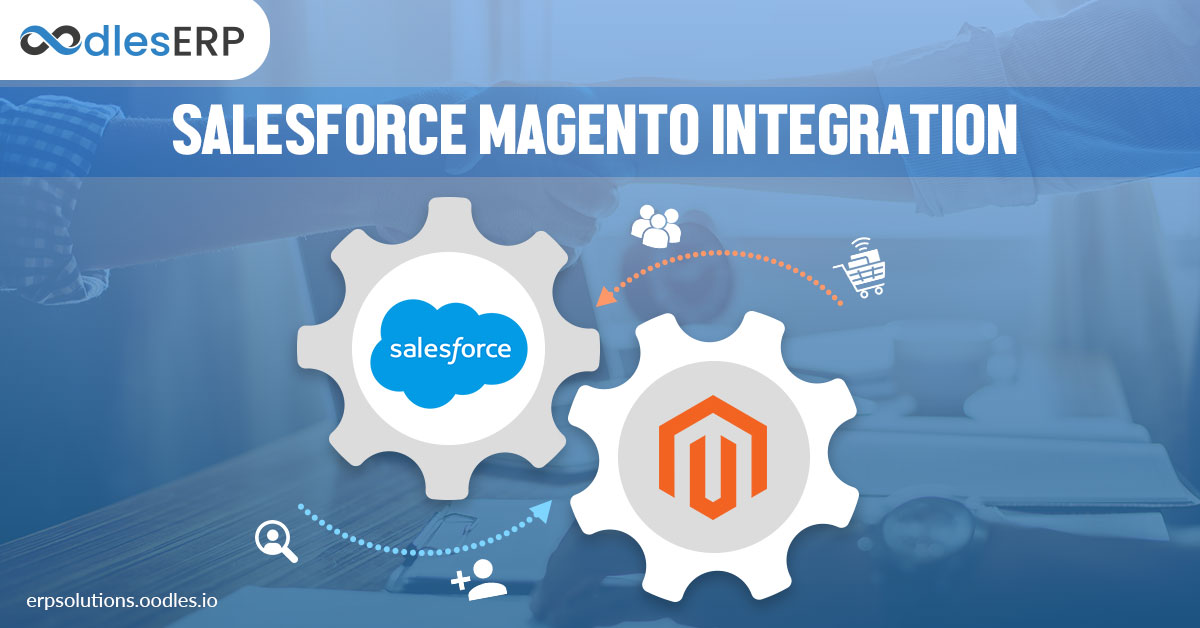Magento is a powerful and flexible open-source eCommerce platform that is fast growing in popularity. However, rather than running it in a stand-alone environment, integrating it with Salesforce CRM will enable businesses to maximize their sales and enhance the customer experience. Salesforce Magento integration gives merchants a 360-degree view of each buyer. It provides business users the infrastructure and an interactive front-end at the same time. Let’s explore how Salesforce Magento integration is enabling retailers to keep customer information, products, orders, and data organized.
At Oodles, we provide Salesforce integration services with various eCommerce stores like Magento, Shopify, and PrestaShop to improve customer satisfaction and streamline business operations. Our phased and flexible methodology ensures businesses get the right solution.
Steps of Salesforce Integration with Magento 2.X
Step 1: Register and create an Account
Users need to sign up to integrate Salesforce CRM and Magento 2.X store

Step 2: Sign Up the Salesforce Account
Login your Salesforce account and click on ‘Make a Zap’ to start integrating the necessary information.

Step 3: Integrate Magento 2.X
Choose a Trigger app that you want to integrate with your Magento store.

Click on ‘Magento 2.X Trigger’. Click on ‘New Customer’ in the drop-down list. Press ‘Save and Continue’.

Now, connect an account to the Magento 2.X account. Enter the details like full domain, admin username, and admin passwords.

Once your Magento 2.X account is created, a screen will display as shown in the figure given below. Click on ‘Save and Continue’

Test Magento 2.X account before going forward with the integration process
Step 4: Integrate Salesforce CRM to Get all Information from Magento 2.X Store
Select ‘Salesforce’ from the ‘Choose an Action’ app

Click on ‘Create Contact’ from the drop-down menu and press ‘Continue’

Next, Select Salesforce account and click on ‘Connect an Account’ and press ‘Continue’

Setup the template. Enter all the relevant information and then click on ‘Continue’
Salesforce testing is successful and now you can click on ‘Finish’

The created Zap will now automatically check new customers on the Magento 2.X store.
Synchronizing Data with Salesforce Magento Integration
Customer Information:
It is an essential part of Magento store information management. Customer information can seamlessly be transferred from the Salesforce platform to the Magento store and vice versa. Salesforce Magento integration enables a seamless handover of an account from a prospect stage to a customer stage. In addition, this information enables the customer service team to operate on accurate and real-time data.
Sync Customer Information from Magento to Salesforce:
* Sync customer data (contact, lead, and account) from Magento store to different modules in Salesforce
* Sync customer data from Magento store to Salesforce whenever a customer signs up a new account
* Automatic updates of customer information in Salesforce whenever there are edits in customer profiles.
Product Details:
The product information is critical for an e-commerce store. Integrating Salesforce with Magento enables e-commerce store owners to successfully manage product-related information like creating new products, changes in product categories, and changes in product parameters. Synchronization of product details improves the operational efficiency of e-commerce businesses.
Sync Product Data from Magento to Salesforce:
* Sync product information like product name, price, and quantity
* Sync product data automatically whenever a new product is created
* Sync product information in Salesforce whenever the information updated in Magento
Campaign Data:
Marketing campaigns play an important role in e-commerce businesses. They are essential as they keep the customers updated about the latest offers. Online store owners have to customize the campaign according to customer requirements to derive maximum benefits. Salesforce Magento integration automates this process and provides the marketing team with the necessary data. The marketing team can then create campaigns based on customers’ previous purchases, amount of purchases and frequency for better results.
Sync Campaign Data from Magento to Salesforce:
* Sync marketing campaign name, discount value, start, and end date
* Sync promotion details in catalog price rules from Magento store to Salesforce CRM
Order Data:
Order data is relevant in scenarios where the scope for customization of products is high. Salesforce is a robust CRM platform that captures the complete details of an order. Integrating these details into a Magento store will reduce manual effort, increase the accuracy of data and improve customer experience.
Sync Order Data from Magento to Salesforce:
* Sync new orders automatically from Magento to Salesforce when customers make new purchases
* Sync orders (opportunities and sales orders) from Magento store to different modules in Salesforce
* Update changes to product orders when order details are changed in Magento store
Integrating Salesforce and Magento with Oodles
Increase your customer retention and improve sales with our Salesforce development services. We provide Salesforce Magento integration services to improve the sales and revenue cycle of organizations. Our goal is to improve the efficiency, productivity, accuracy, and speed of eCommerce operations while reducing costs.
Our development team integrates Salesforce and Magento using REST/RESTful APIs. Our phased, flexible and agile integration methodology clearly visualizes your business requirements, ensures a proper backup of your Magento store and synchronizes data before moving forward with the integration.
Connect with our ERP development team to Know More!
To Read Next: Improving Business Efficiency with Salesforce QuickBooks Integration








